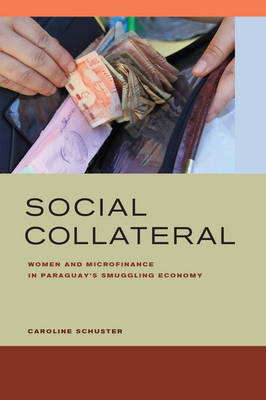
Social Collateral
Women and Microfinance in Paraguay’s Smuggling Economy
Seiten
2015
University of California Press (Verlag)
978-0-520-28705-1 (ISBN)
University of California Press (Verlag)
978-0-520-28705-1 (ISBN)
- Lieferbar (Termin unbekannt)
- Versandkostenfrei innerhalb Deutschlands
- Auch auf Rechnung
- Verfügbarkeit in der Filiale vor Ort prüfen
- Artikel merken
Microcredit is part of a global trend of financial inclusion that brings banking services, especially small loans, to the world's poor. In this book, the author explores Paraguayan solidarity lending as a window into the tensions between social development and global finance.
Microcredit is part of a global trend of financial inclusion that brings banking services, especially small loans, to the world's poor. In this book, Caroline Schuster explores Paraguayan solidarity lending as a window into the tensions between social development and global finance. Social Collateral tracks collective debt across the commercial society and smuggling economies at the Paraguayan border by examining group loans made to women by nonprofit development programs. These highly regulated loans are secured through mutual support and peer pressure - social collateral - rather than through physical collateral. This story of social collateral necessarily includes an interwoven account about the feminization of solidarity lending. At its core is an economy of gender - from pink - collar financial work, to men's committees, to women smugglers. At stake are interdependencies that bind borrowers and lenders, financial technologies, and Paraguayan development in ways that structure both global inequality and global opportunity.
Microcredit is part of a global trend of financial inclusion that brings banking services, especially small loans, to the world's poor. In this book, Caroline Schuster explores Paraguayan solidarity lending as a window into the tensions between social development and global finance. Social Collateral tracks collective debt across the commercial society and smuggling economies at the Paraguayan border by examining group loans made to women by nonprofit development programs. These highly regulated loans are secured through mutual support and peer pressure - social collateral - rather than through physical collateral. This story of social collateral necessarily includes an interwoven account about the feminization of solidarity lending. At its core is an economy of gender - from pink - collar financial work, to men's committees, to women smugglers. At stake are interdependencies that bind borrowers and lenders, financial technologies, and Paraguayan development in ways that structure both global inequality and global opportunity.
Caroline E. Schuster is Lecturer in the School of Archaeology and Anthropology at Australian National University.
List of Illustrations Acknowledgments Introduction Part One: Regulatory Forms 1. Entrepreneurship 2. Liability Part Two: Life Cycles of Loans 3. Creditworthiness 4. Repayment 5. Renewal Conclusion Notes Works Cited Index
| Erscheint lt. Verlag | 13.11.2015 |
|---|---|
| Zusatzinfo | 12 b-w |
| Verlagsort | Berkerley |
| Sprache | englisch |
| Maße | 152 x 229 mm |
| Gewicht | 408 g |
| Themenwelt | Sozialwissenschaften ► Soziologie ► Gender Studies |
| Betriebswirtschaft / Management ► Spezielle Betriebswirtschaftslehre ► Bankbetriebslehre | |
| ISBN-10 | 0-520-28705-3 / 0520287053 |
| ISBN-13 | 978-0-520-28705-1 / 9780520287051 |
| Zustand | Neuware |
| Haben Sie eine Frage zum Produkt? |
Mehr entdecken
aus dem Bereich
aus dem Bereich
denken und handeln wie ein professioneller Trader
Buch | Softcover (2023)
Vahlen, Franz (Verlag)
36,90 €


